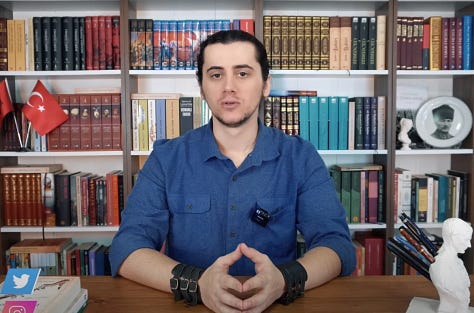Aren’t debates fascinating? They bring truth to light in a way that few other things can. Witness Biden vs. Trump. We all kind of knew that Biden wasn’t up to it any more, but it was a different thing entirely to see it happen.
What a spectacle that was. What a disaster.
But you all don’t come here for American politics, and it just so happens that in Turkey, there’s a different debate everyone is talking about. It concerns an Internet-famous agnostic who has been debating Islamists over the past few months, and he has been so successful that the authorities took note. They’ve deemed him dangerous and issued an arrest warrant against him.
I’ll first provide some background, explain the offending debate, then reflect on the broader significance of the event.
The debater in question is a young man called Diamond Tema. He is perhaps the most popular among a whole wave of Turkish YouTubers who talk about philosophy and existential questions. Some of Diamond’s most watched videos go well over an hour, and have titles such as “Why I’m an Agnostic,” “the Quran and science” and “Why do all religions resemble each other.” Other videos dwell on the Apology of Socrates, discuss religion in Ancient Egypt, or the prophet Muhammed’s experience of revelation.
Diamond is usually well-read, makes measured claims, and speaks with authority. I think he’d benefit from reading secondary sources more widely, but perhaps that emphasis on primary source material is part of his appeal. You’re not getting a literature review with him, you’re getting someone who’s reading the great works you wish you had read, and is happy to talk to you about it.
Diamond does it in a way that’s warm and down to earth. In between heavy content, he’ll speak about his daily routines, get into political polemics, and will goof around every now and then. All that makes his channel is a comfortable thing to watch for young men. Diamond himself started his channel in his mid-20s and has recently turned 30. With his broad build and long wavy hair, he looks like a cross between Voltaire and Conan the Barbarian (or Tarkan). Among the more than million people who follow Diamond on YouTube, 80 percent are male, and 60 percent are between the ages of 18 and 34. I’d guess that a majority of that viewership has university degrees, identify as being an educated person, but secretly know that they aren’t. For them, watching Diamond’s videos becomes a sneaky way to compensate for the gap between their aspirations and reality.
I should note that there are parts of Turkish philosophy YouTube that are significantly less bro-ey. See, for example, Pelin Dilara Çolak, who is more credentialed, less polemical, but also very engaging to watch (a bit like Alain de Botton). She also interacts with some of the same people and ideas as Diamond, but talks more about the “good life” and less about right and wrong.



Politically, Diamond is a bit tricky to place. He has basic Kemalist commitments and gives off Turkist vibes, but seems too frustrated with the political scene to really dwell on it. He’s also Albanian-Turkish, but unlike second or third-generation Albanian-Turks (like yours truly), he actually speaks Albanian. His family moved to Turkey in the 1990s to flee the Albanian civil war, but now appear to be based in Albania once again. People sometimes assume that “Diamond” is an Internet nickname, but it’s his actual name (“Diamant” apparently). I think that Albanian background gives him a critical distance from Turkishness and allows him to interrogate Turkish Islamism with more rigor.
I should say that being a Substacker, I feel a certain kinship with Diamond and people like him. It’s hard being out here on the internet, trying to cut through the noise, building an audience. Yes, it sometimes does take a little song and dance, but that’s the price you pay for independence. As institutions like schools, universities and news media are breaking down around us, there’s a real hunger for serious discussion of existential questions. People like Diamond directly speak to that need.
That brings us to the trouble Diamond has gotten himself into.
A big part of Diamond’s brand is being an agnostic. And it’s not a soft agnosticism that sort of shrugs and moves away from religious discussions. It’s much closer to a atheism in the sense that he’s eager to establish a contrast with organized religion, really pointing out why the existence of an all-creating deity is unknowable (see here for a 2-hour explanation of his position) and how orthodox religious traditions aren’t tenable. To his credit, he does his best not to be hostile or impolite to believers, especially toward Muslims. He’s generally pretty gentle in his reading of mainstream Muslim texts (many of which are published by Diyanet, Turkey’s official religious body) but isn’t shy about pointing out that he disagrees with the premise of revelation and the Abrahamic God, or the idea of a knowable god in general. An English-speaking counterpart might be Alex O’Connor, a YouTuber skeptic with a higher profile, but fewer followers than Diamond. The attitude these figures are cultivating reminds me a bit of Bart D. Ehrman, whom I hold in high esteem as an agnostic scholar of Christianity. They all aspire to know religious texts better than the believers themselves, and reflect on them in as neutral and analytical a way as possible.
That works fine when you’re making home videos. At some point though, Diamond started debating Islamists. That required him to be a little more assertive in his statements, which got the public’s attention.
Keep reading with a 7-day free trial
Subscribe to Kültürkampf to keep reading this post and get 7 days of free access to the full post archives.



